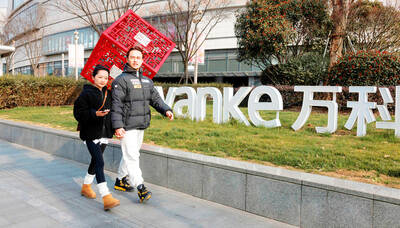As Chinese companies stocked up on electronics products ahead of an expected Lunar New Year buying spree, Taiwan’s factory output set yet another record high last month by expanding 19.4 percent from a year ago, the Ministry of Economic Affairs said yesterday.
The index of industrial output hit 130.34 last month, up 3.1 percent from October. This was the sixth time that factory output reached record level this year, with five straight record highs from March to July.
Beatrice Tsai (蔡美娜), deputy director general of the ministry’s statistics department, said the Lunar New Year holiday, which falls in early February next year, has prompted companies to build up their inventories and that has kept Taiwanese factories busy.
“Economic growth in China has surpassed that of Europe and the US,” Tsai said, adding that the effect impacted Taiwanese factories, which in the past saw highest output in August and October for the Christmas shopping spree.
Now the highest output has occurred in November, marking a shift of dependence toward Lunar New Year’s effect, she said.
Factory output for this month is expected to post 25 percent growth year-on-year, while output for the year looks set to expand more than 20 percent from last year, which would be another record high.
The record was set in 1971, when industrial output grew by 23.4 percent, while the next-highest figure was in 1978 with 22.5 percent growth.
Factory output for the first 11 months jumped 27.3 percent from the same period last year.
Manufacturing industry production — which accounts for more than 90 percent of Taiwan’s total factory output, and includes the electronics, chemicals, machinery as well as food and textile sectors — grew 29 percent for the first 11 months.
Output of electronic components — a major manufacturing industry sub-sector — was up 44.3 percent and those for machinery rose 62.5 percent — marking the highest rise among all manufacturing sub-sectors.
The ministry said on Monday that export orders hit its second-highest recorded level of US$35.74 billion last month, up 14.3 percent from a year earlier, amid the backdrop of strong international demand for Taiwanese consumer electronics.
The ministry yesterday released consumption figures for last month. Total sales for the wholesale, retail as well as food and beverage sectors totaled NT$1.17 trillion (US$39.2 billion) amid strong domestic consumption. That was a 5.9 percent increase from last year, but a drop of 3.2 percent from October, the figures show.
Combined sales for the first 11 months rose 10 percent to NT$12.47 trillion.
Tsai said a lower unemployment rate, higher salaries and the rising stock market were all factors pushing up local consumption.

CHIP RACE: Three years of overbroad export controls drove foreign competitors to pursue their own AI chips, and ‘cost US taxpayers billions of dollars,’ Nvidia said China has figured out the US strategy for allowing it to buy Nvidia Corp’s H200s and is rejecting the artificial intelligence (AI) chip in favor of domestically developed semiconductors, White House AI adviser David Sacks said, citing news reports. US President Donald Trump on Monday said that he would allow shipments of Nvidia’s H200 chips to China, part of an administration effort backed by Sacks to challenge Chinese tech champions such as Huawei Technologies Co (華為) by bringing US competition to their home market. On Friday, Sacks signaled that he was uncertain about whether that approach would work. “They’re rejecting our chips,” Sacks

Taiwan’s long-term economic competitiveness will hinge not only on national champions like Taiwan Semiconductor Manufacturing Co. (TSMC, 台積電) but also on the widespread adoption of artificial intelligence (AI) and other emerging technologies, a US-based scholar has said. At a lecture in Taipei on Tuesday, Jeffrey Ding, assistant professor of political science at the George Washington University and author of "Technology and the Rise of Great Powers," argued that historical experience shows that general-purpose technologies (GPTs) — such as electricity, computers and now AI — shape long-term economic advantages through their diffusion across the broader economy. "What really matters is not who pioneers

BUBBLE? Only a handful of companies are seeing rapid revenue growth and higher valuations, and it is not enough to call the AI trend a transformation, an analyst said Artificial intelligence (AI) is entering a more challenging phase next year as companies move beyond experimentation and begin demanding clear financial returns from a technology that has delivered big gains to only a small group of early adopters, PricewaterhouseCoopers (PwC) Taiwan said yesterday. Most organizations have been able to justify AI investments through cost recovery or modest efficiency gains, but few have achieved meaningful revenue growth or long-term competitive advantage, the consultancy said in its 2026 AI Business Predictions report. This growing performance gap is forcing executives to reconsider how AI is deployed across their organizations, it said. “Many companies

China Vanke Co (萬科), China’s last major developer to have so far avoided default amid an unprecedented property crisis, has been left with little time to keep debt failure at bay after creditors spurned its proposal to push back a looming bond payment. Once China’s biggest homebuilder by sales, Vanke failed to obtain sufficient support for its plan to delay paying the 2 billion yuan (US$283.51 million) note due today, a filing to the National Association of Financial Market Institutional Investors showed late on Saturday. The proposal, along with two others on the ballot, would have allowed a one-year extension. All three